What to Expect from Medication Management in Addiction Recovery

Introduction: A Key Component in Recovery
In the multifaceted journey of addiction recovery, medication management emerges as a vital component, playing a pivotal role in helping individuals navigate the complex landscape of healing from substance use disorders. Distinct from traditional methods, medication management offers a structured, clinically supervised pathway that combines pharmacological interventions with behavioral therapies to optimize recovery outcomes.
The Role and Impact of Medication in Recovery
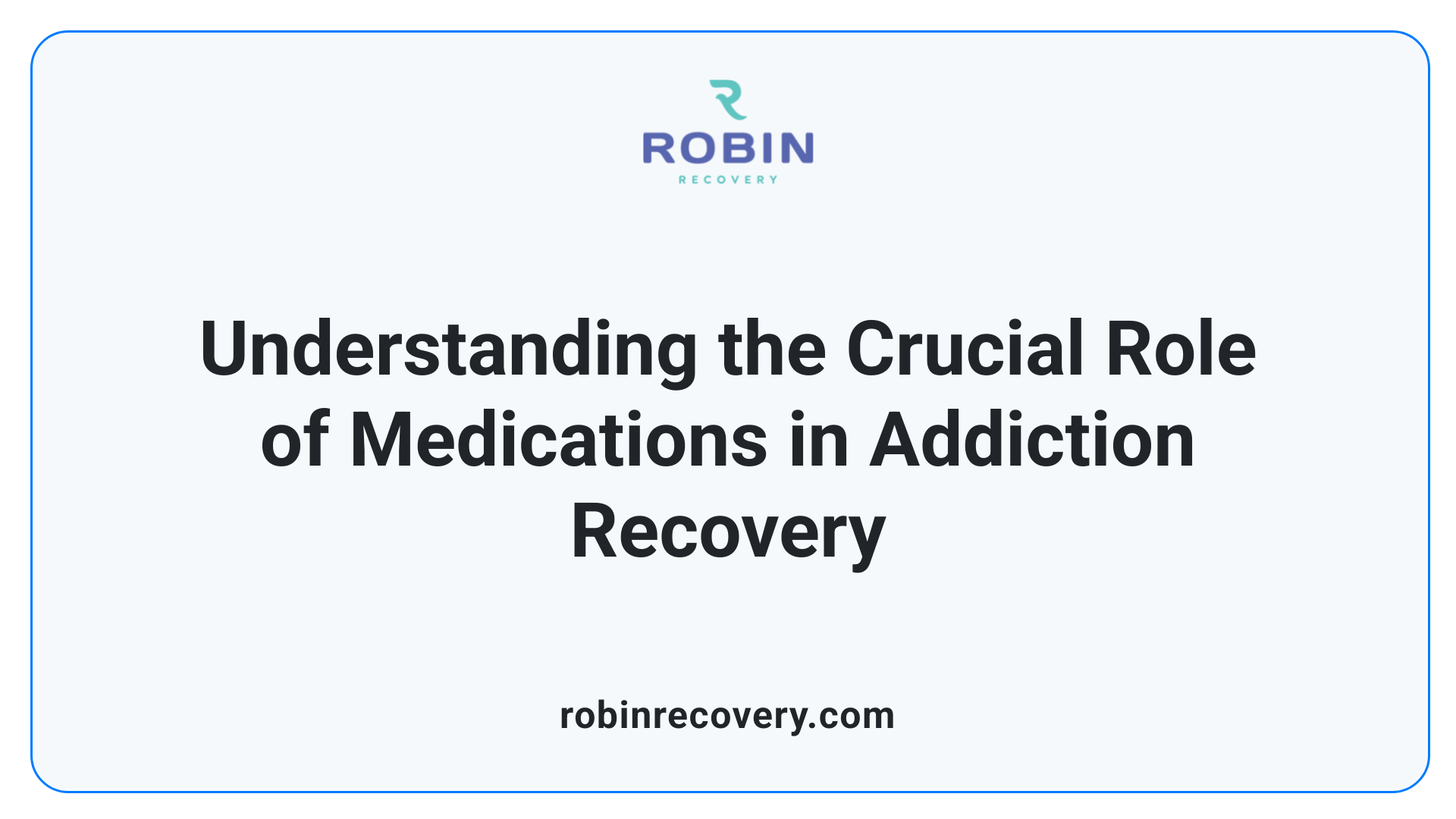
What is the role of medication in addiction recovery?
Medication plays a crucial role in addiction recovery, particularly through Medication-Assisted Treatment (MAT). This approach combines medications with counseling and behavioral therapies to provide a holistic strategy for treating substance use disorders.
The FDA has approved several medications that are essential in addressing two major forms of addiction: Alcohol Use Disorder (AUD) and Opioid Use Disorder (OUD). Common medications for AUD include:
Medication Name Purpose Notes Acamprosate Reduces cravings Effective post-detox Disulfiram Causes unpleasant reactions when drinking Motivational support Naltrexone Blocks euphoric effects Can be used for both AUD and OUD
For OUD, frequently prescribed medications include:
Medication Name Purpose Notes Buprenorphine Reduces cravings and withdrawal symptoms Can be prescribed in outpatient settings Methadone Long-acting opioid Requires strict regulation Naltrexone Blocks the effects of opioids Also available for AUD
These medications not only ease withdrawal symptoms and cravings but also provide safety during the treatment process. For instance, Naloxone is crucial for reversing opioid overdoses, highlighting the importance of medications in enhancing treatment safety.
When medication is paired effectively with therapy, it can have transformative effects. Research shows that this combination promotes better engagement in treatment, reduces illicit drug use, and ultimately improves the quality of life for individuals on their recovery journey. Through medication management, patients can achieve stabilization that supports their overall rehabilitation efforts.
Navigating Medication Management: A Process Overview
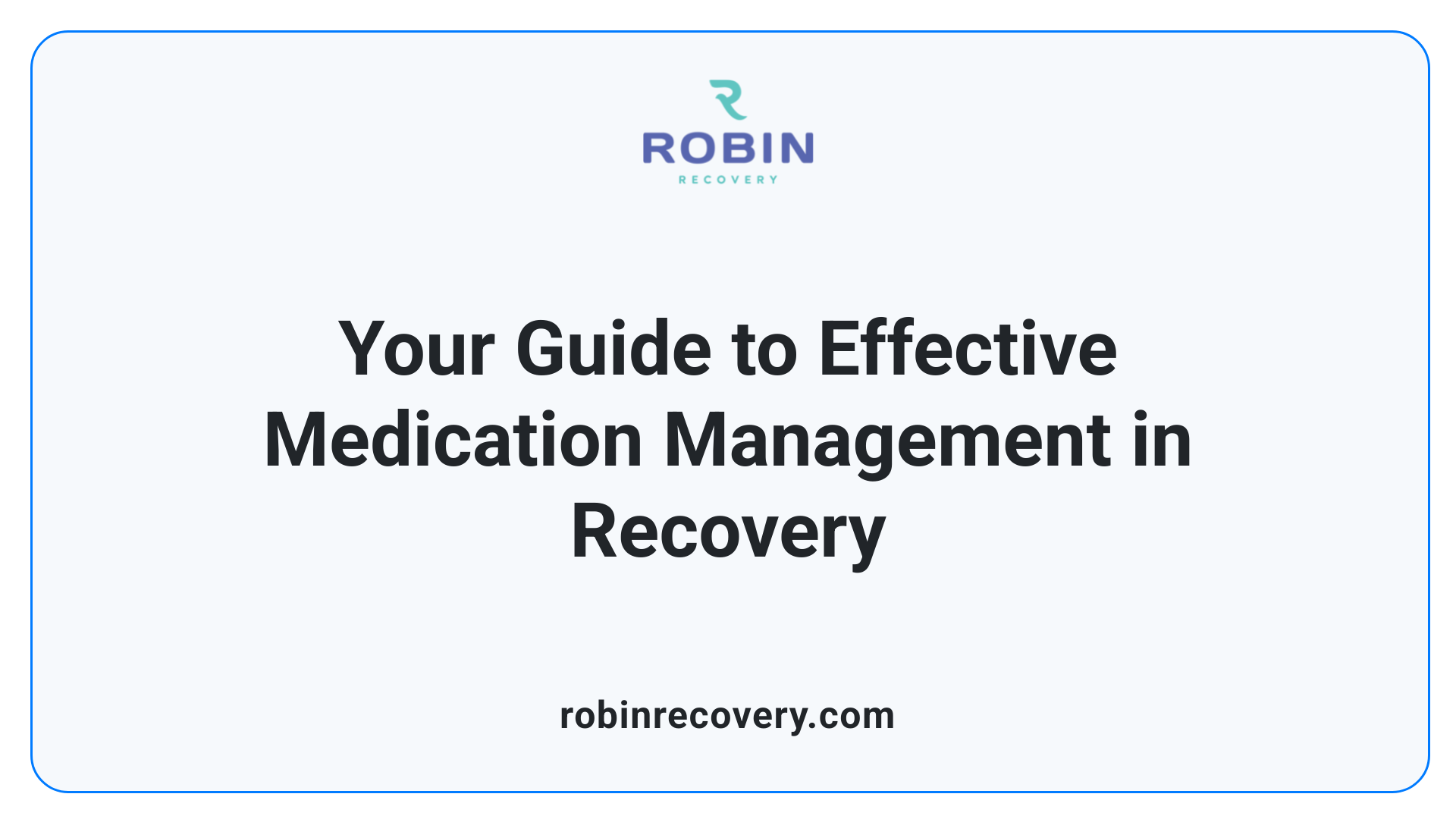
What does medication management entail?
Medication management is a comprehensive approach designed to oversee a patient's medication regimen, ensuring both safety and effectiveness.
- Initial Assessments: This begins with a thorough assessment of the patient's medical history, including any co-occurring conditions and current medications. This evaluation helps in crafting a personalized treatment plan tailored to each individual's unique health needs.
- Regular Monitoring and Follow-Ups: Ongoing monitoring includes regular follow-up appointments to evaluate medication adherence, check for side effects, and assess the effectiveness of the prescribed treatments. These meetings are essential for adjusting dosages and ensuring the patient remains on track.
- Health Condition Evaluations: Continued evaluations of the patient’s mental health and substance use are critical, allowing healthcare professionals to address any new or persisting challenges, thus optimizing therapy outcomes.
Overall, collaboration among patients, caregivers, pharmacists, and healthcare providers is essential for developing an integrated medication plan aimed at improving health and enhancing recovery from substance use disorders.
Inside the Medication Management Appointment
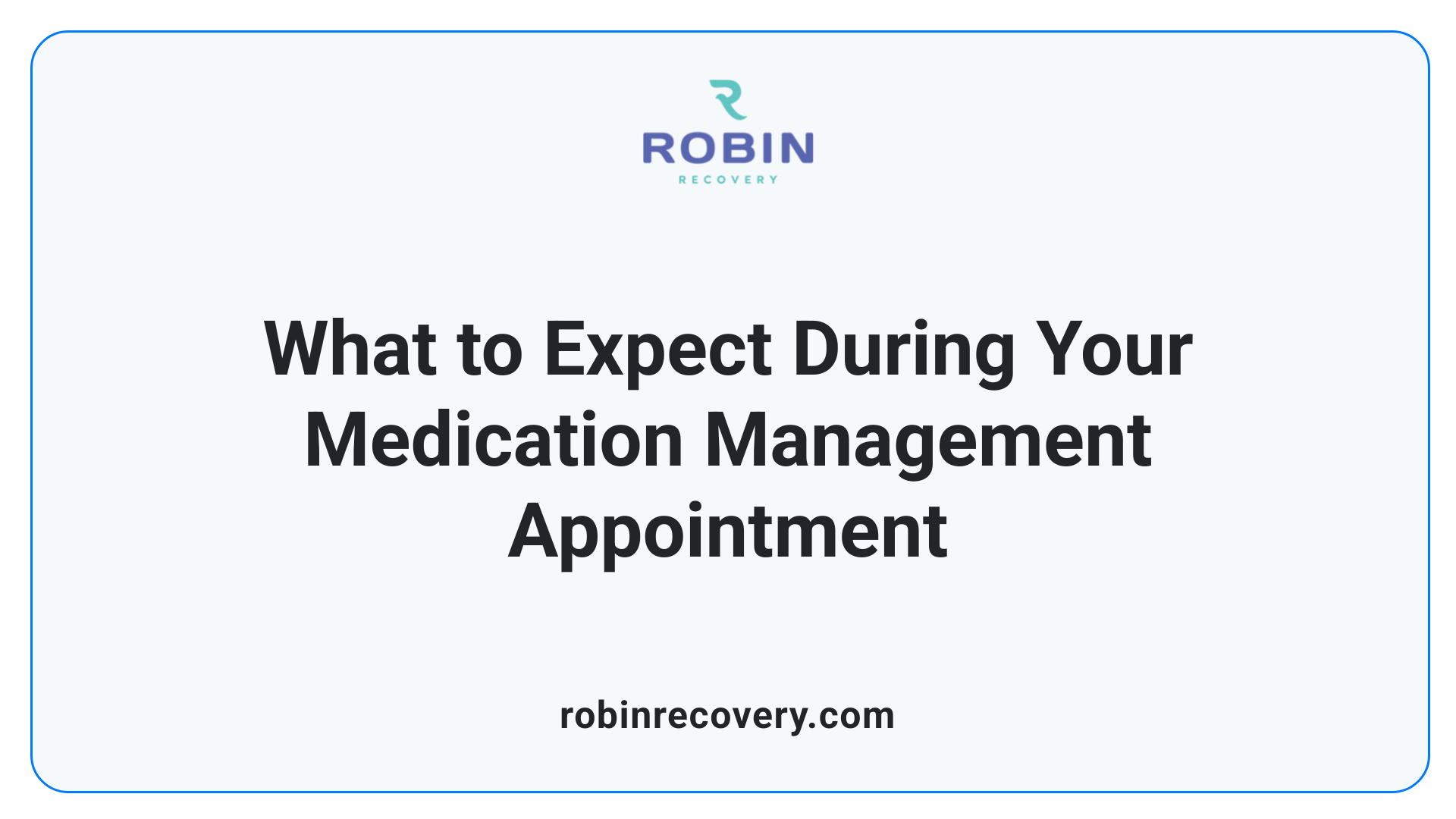
What happens at a medication management appointment?
During a medication management appointment, several crucial steps occur. Initially, the psychiatrist will conduct an initial assessment of your symptoms and medical history. This helps determine if medication is appropriate for your mental health disorder, taking into account past treatments and any concurrent conditions.
The psychiatrist will discuss the benefits and potential side effects of various medications. Recognizing that not all medications work the same for everyone, a trial-and-error approach is often employed to find the most effective option tailored to your needs. The initial visit typically lasts about an hour, giving ample time to cover these vital aspects.
Integration with therapies
Follow-up appointments, usually around 30 minutes, focus on monitoring the effectiveness and any side effects of prescribed medications. In addition, combining medication management with counseling or psychotherapy is often recommended. This integrated approach addresses both the emotional and physiological aspects of disorders like anxiety, depression, and bipolar disorder, enhancing overall treatment effectiveness.
Integration of Medication Management and Therapy
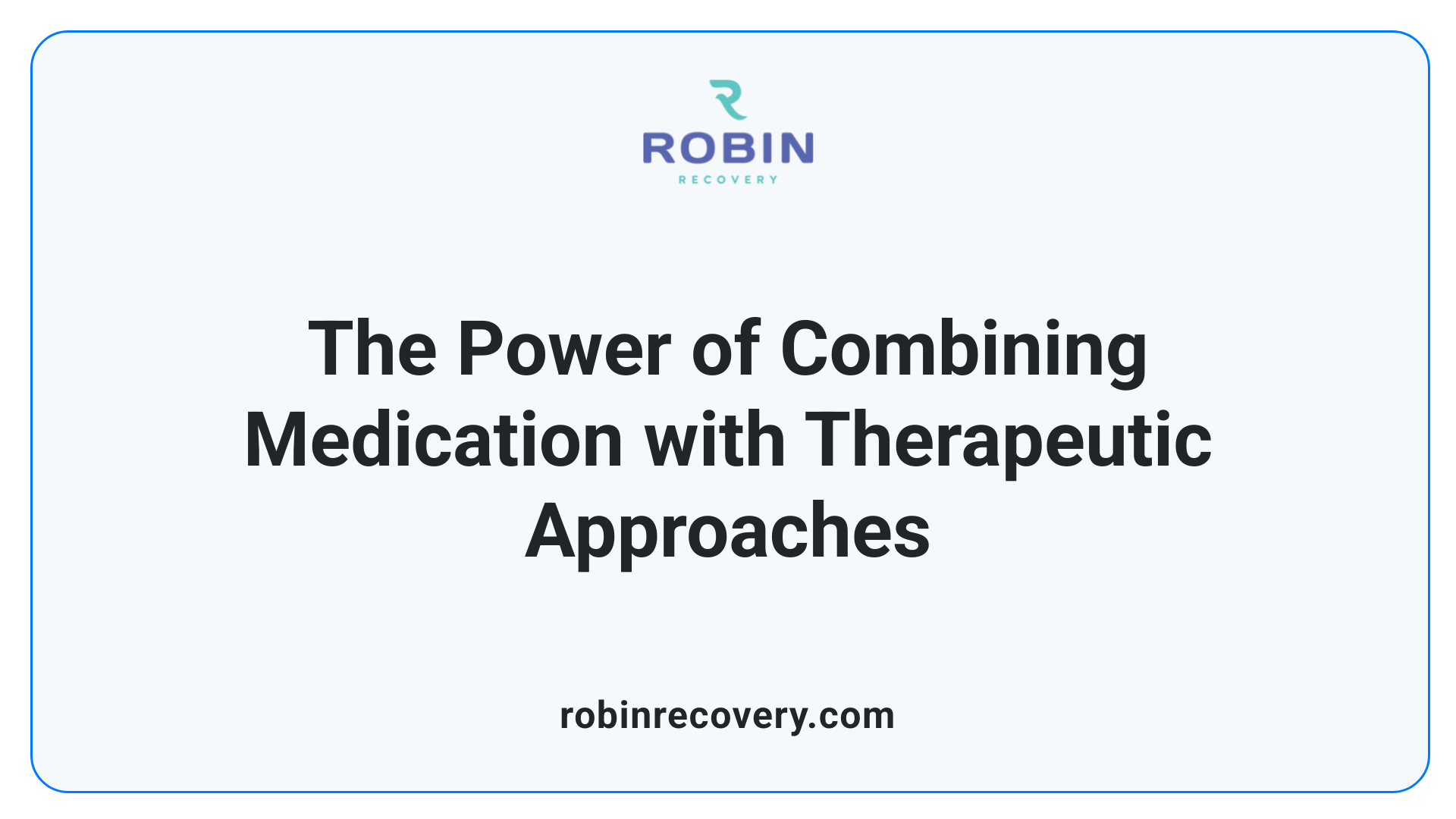
How does medication management integrate with therapy in supporting recovery?
Medication management plays a crucial role in the integration with therapy to support recovery from substance use disorders. This approach, known as Medication-Assisted Treatment (MAT), combines medications with counseling and behavioral therapies, enhancing treatment outcomes. Medications such as buprenorphine and naltrexone help normalize brain chemistry and alleviate cravings, making it easier for individuals to engage in therapeutic processes.
The combination of medication and therapy increases treatment retention and improves overall recovery success. For instance, FDA-approved medications not only assist in managing withdrawal symptoms but also help regulate co-occurring mental health conditions, such as anxiety and depression, that might complicate addiction recovery.
Access to resources like SAMHSA's National Helpline and FindTreatment.gov proves invaluable, as they connect individuals with local treatment facilities and support groups. By leveraging these resources, individuals can better navigate their recovery journey while benefiting from tailored treatment plans that include ongoing monitoring and support services.
Understanding Risks and Safety in Medication Management
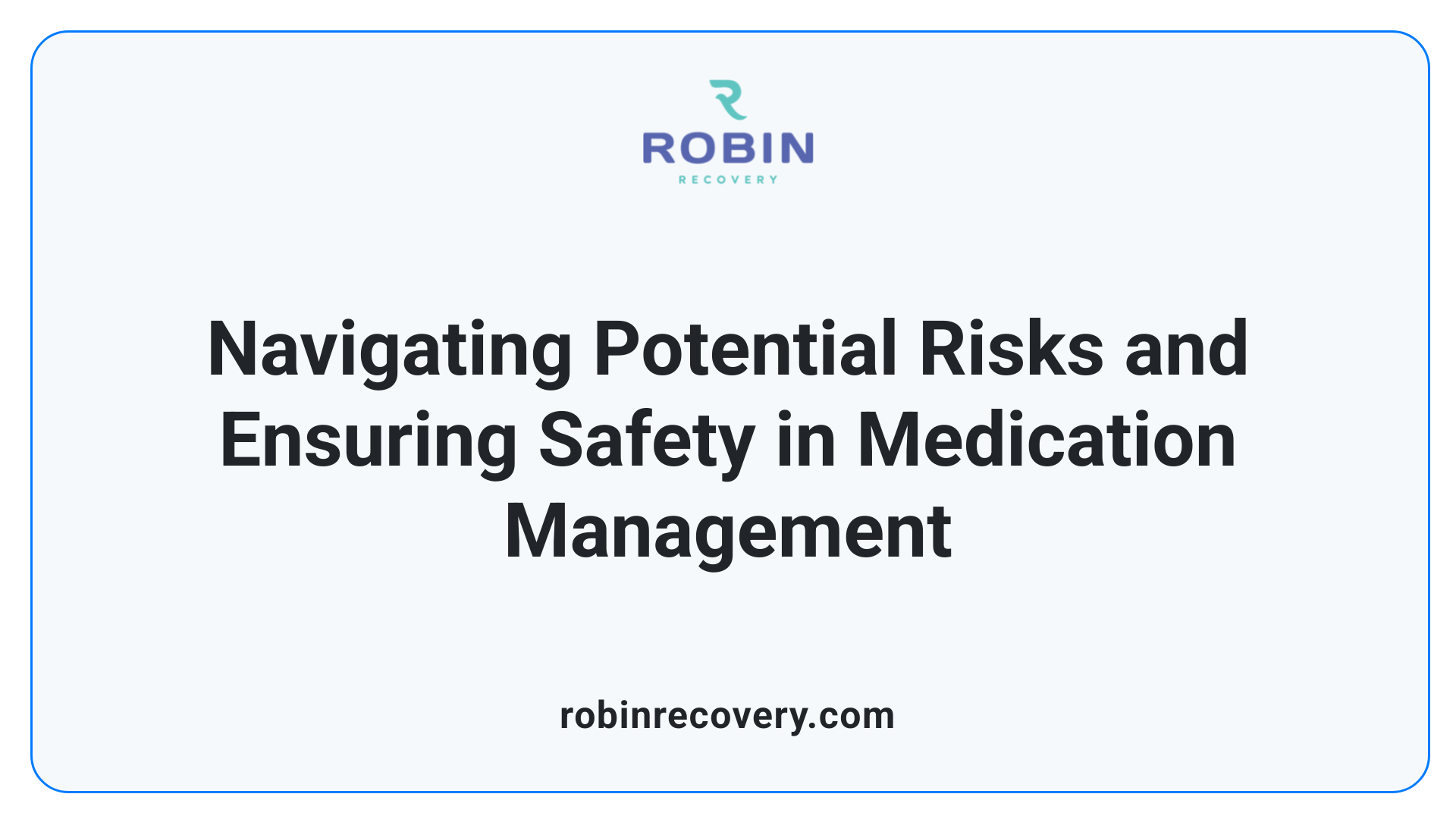
What are the potential side effects and risks associated with medications used in addiction treatment?
The potential side effects and risks associated with medications used in addiction treatment can greatly vary based on the specific medications prescribed.
For instance, medications for Alcohol Use Disorder (AUD) such as acamprosate, disulfiram, and naltrexone can lead to:
- Gastrointestinal issues (nausea, vomiting)
- Headaches
- Allergic reactions
On the other hand, treatments for Opioid Use Disorder (OUD) like buprenorphine and methadone come with their own set of risks, including:
- Respiratory depression
- Dependence
- Overdose
Importance of monitoring and professional guidance
Given these potential side effects, careful monitoring is essential. It helps to avoid any harmful interactions with other substances and ensures the effectiveness of the treatment.
It's crucial for individuals to engage closely with healthcare providers, who can guide them through managing these risks while they receive comprehensive treatment for substance use disorders. Regular follow-ups and communication with healthcare professionals about any concerns or side effects can significantly enhance the safety and efficacy of medication management.
Expected Outcomes and Long-term Benefits
What are the expected outcomes of effective medication management in addiction recovery?
Effective medication management in addiction recovery can lead to significant positive outcomes. One of the most notable is improved patient survival rates. Studies show that when FDA-approved medications are tailored to individual needs, patients experience a normalization of brain chemistry, which significantly reduces cravings. This is particularly critical for those facing alcohol and opioid use disorders.
Furthermore, the integration of medication management with counseling and behavioral therapies enhances the overall treatment approach. This holistic method helps to decrease illicit drug use and improves retention in treatment programs. Research indicates that patients engaged in these comprehensive programs have better long-term success rates, including higher employment retention and improved social functioning.
How does medication management contribute to long-term stability and quality of life improvements?
Patients benefiting from effective medication management often find long-term stability in their recovery journey. Medications like buprenorphine, which can be prescribed in outpatient settings, broaden access to treatment, supporting individuals where they need it most.
In combination with ongoing support from counseling and therapy, patients report significant improvements in their quality of life. They experience enhanced daily functioning, better relationship management, and an overall healthier lifestyle. This comprehensive approach ensures that not only are withdrawal symptoms managed, but emotional and psychological challenges are addressed, fostering a smoother path toward sustainable recovery.
Conclusion: A Balanced Approach to Recovery
Medication management is not just a treatment method but a comprehensive framework that incorporates medication, therapy, and ongoing professional support, proving to be a cornerstone in the recovery journey from substance use disorders. It requires collaboration among healthcare providers, patients, and families, making it a communal effort towards achieving health, stability, and resilience. As research evolves and resources expand, the blending of personalized medication protocols with behavioral therapies will continue to offer hope and improved quality of life to those seeking lasting recovery from addiction.
References
- National Helpline for Mental Health, Drug, Alcohol Issues - SAMHSA
- What Is Medication Management? | Addiction Recovery Idaho
- Medications for Substance Use Disorders - SAMHSA
- Moving Forward: How Medication Management Supports Recovery ...
- Treatment and Recovery | National Institute on Drug Abuse (NIDA)
- The Importance of Therapy & Medication Management Together
- Medication Management Skills Are Essential For Life After Treatment
- Medication Assisted Treatment (MAT) - American Addiction Centers
- What to Expect for Medication Management | Mental Health
